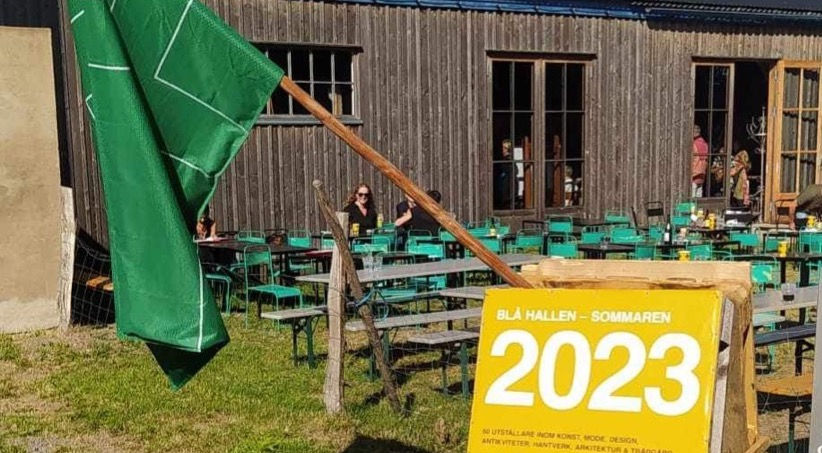Micronationalism and charitable actions
- Olivier Martinez
- 5 oct. 2023
- 4 min de lecture
Apart from what can be created and conveyed from a computer, the real areas of activity of micronations remain limited. Some seek meaning beyond their virtual existence. It is through this intention common to a large number of people that charitable actions have developed.

Charitable action is an area in which micronations can demonstrate their usefulness and therefore, a form of legitimacy to exist. This concerns more particularly micronations having a physical population on their territory of activity, but also those whose very existence is motivated by an environmental, cultural or social cause.
Let's start with Ladonia, a micronation which meets all the criteria we have just mentioned. Its fight for freedom of expression came to fruition this year with an exhibition on Lars Vilks, its founder who died accidentally on the road in Sweden.
The event was held during the month of July at Blå Hallen in Höganäs, the municipality which borders Ladonia in Sweden and which was its partner. The exhibition brought together the work of Lars Vilks and that of other artists who were inspired by him. The idea is to help visitors understand their interpretations and thoughts on free expression.

Let's now go to the Principality of Aigues-Mortes. The micronation was based on the concept of alternative citizenship to energize and promote its territory. Its currency is still the only micronational currency in the world to be legally in circulation. Initially economic, this achievement is now having positive repercussions on its social actions. They allow it to have a major solidarity network within the city.
Thanks to this network, charitable actions are carried out to raise funds in several areas. This is how the Principality participated in the renovation of a 15th century chapel and in a “Pink October” operation in favor of the fight against breast cancer. The league against cancer and the Principality of Aigues-Mortes are today continuing discussions to carry out joint actions under the leadership of Princess Olivia-Eugénie d'Aigues-Mortes.

For his part, Prince Jean-Pierre IV of Aigues-Mortes will be in Biarritz (France) on October 10, at the start of the “Trophée Roses des Sables” women’s charity rally. The Prince will be present to support his principality's team. The two Aigues-Mortaise women pilots who are participating in this race will distribute school supplies and hygiene items to the children they meet in the villages on their route to Morocco. These supplies were partly collected by the Principality of Aigues-Mortes. Participants in this rally must also contribute to the fight against breast cancer by raising funds before their departure. Here again, the Principality of Aigues-Mortes participated in this money collection.
The Chancellor of the Principality, Duke Geoffrey of Mathes le Cailar, has expanded the government with the appointment of a new Secretary to the Prince for Animal Rights. This is Duchess Claudia de Nyffenegger who took office this week with an awareness campaign in Aigues-Mortes to support a private feline shelter. A fundraiser through the sale of the Principality's flags has been set up for this purpose until the end of October.
“ US$ 61,000 and over 7,000 hours of charity work ”
Now let's cross the Atlantic to Sandus State. Although this micronation has no official charitable program, citizens have long had a social obligation to do charity in their personal lives, and this began in the early years after its founding. In Sandus State, everyone decides what they want to do, how much, what (money, work, time, donations) and to whom they give it. What matters most is being aware of the needs of others and having compassion.

To ensure that this legal obligation is followed. Sandus State submits a form and quarterly reports. Each quarter, citizens fill out a TC-3: Charity Tax form. They declare what charity work they did during the last season. Many people give money to charitable causes (especially religious, political, and social organizations or causes), but many people also volunteer or donate old clothes, furniture, and utensils to those who need.
Since Sandus State began keeping records in the fall of 2012, $61,000 has been donated and more than 7,000 hours of charitable work have been contributed by Sandus citizens. We can speak of a colossal performance on a micronational scale.
Since 2020, the State of Sandus has deplored a significant decline in its charitable works among its fellow citizens. It's a post-covid phenomenon that has been seen around the world and the North American micronation is no exception.
In the State of New York, the Sovereign Princely House of Navasse focuses its action on two axes, the first is in favor of the empowerment of communities in Haiti, by offering scholarships to young people so that they can attend schools (more than 95% of primary and secondary schools in the country are private).

The second supports LGBTQ+ advocacy groups. The princely household organizes events and initiatives by establishing and maintaining relationships with local and regional groups and entities. among these initiatives is the creation of a website welcoming new LGBTQ+ households by offering them resources to settle in less hostile places.

We see it clearly through all these examples, micronationalism is fully part of solidarity action and this continues with the birth of micronations entirely dedicated to noble causes. This is the case of the Seigneurie d'Auxilium, born a year ago from the desire to better support elderly or disabled people residing in specialized medical homes. The young Lord Mel 1st of Auxilium hopes to bring his micronation into the Microfrancophonie to obtain better visibility and more micronational support for his cause.
There are many micronations active in humanitarian, social, environmental and cultural works. We cannot cite them all with regret. “We are what we do” some say and it is with this saying that we will recognize micronationalism as exemplary in terms of charitable works.



Comments